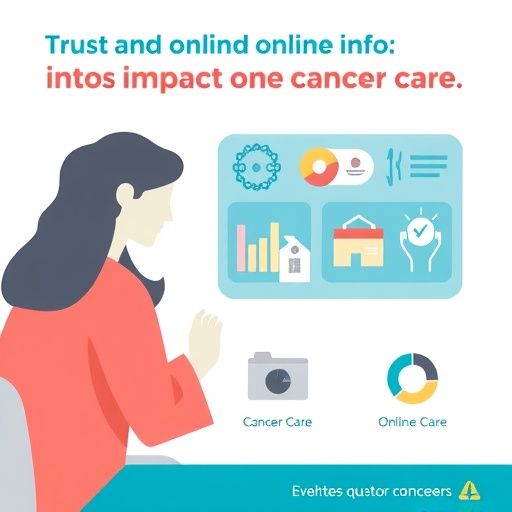In recent years, the discourse surrounding patient-centered care has gained significant traction, particularly within the realm of oncology. A pivotal study conducted by Eskiler, Bilir, and Altunisik delves into the intricacies of patient-centered communication and its correlation with health outcomes among Turkish cancer patients undergoing chemotherapy. This research unveils compelling insights, highlighting the essential roles of trust and online information-seeking behaviors in improving patient experiences and health outcomes.
As cancer treatment evolves, understanding the dynamics of communication between healthcare providers and patients becomes increasingly critical. The researchers embarked on an extensive examination of how effective communication can cultivate trust, which is vital for fostering a therapeutic relationship. This trust not only influences patient adherence to treatment protocols but also heavily impacts their psychological well-being during the often grueling process of chemotherapy.
One of the study’s remarkable findings emphasizes that patients who actively engage with their healthcare providers are more likely to experience better health outcomes. This engagement is not solely reliant on face-to-face interactions; rather, it encompasses various communication forms, including digital platforms that facilitate information sharing. The study further discusses how online information seeking empowers patients, enabling them to become active participants in their own healthcare journeys.
In Turkey, where healthcare systems have been rapidly evolving, the patient-healthcare provider dynamic is undergoing profound changes. The researchers identified that traditional communication methods are gradually being supplemented by digital interactions, where patients seek information through various online channels. This shift signifies a movement towards a more informed patient population that values the role of knowledge in their health decision-making processes.
Moreover, the researchers highlighted the significance of trust between patients and healthcare providers as a cornerstone of effective communication. Trust is not only built through consistent and transparent communication but also through a demonstrated commitment from providers to listen and respond to patient concerns. This level of engagement fosters a supportive environment where patients feel safe to express their anxieties and preferences regarding treatment options.
The role of technology cannot be overstated in this context. As more patients turn to online resources for information about their conditions and treatments, the reliance on healthcare providers as the sole source of information diminishes. This dual engagement—seeking information online while maintaining open channels of communication with providers—creates a unique synergy that can enhance treatment adherence and satisfaction.
Furthermore, the study explored the psychological implications of effective communication on patients. It suggested that when patients feel heard and understood by their healthcare teams, they are more likely to adhere to treatment protocols and report higher levels of satisfaction with their care. This psychological dimension is crucial, as anxiety and fear are common in cancer patients, and a strong communicative relationship can mitigate some of these emotional burdens.
While the study primarily focuses on Turkish patients, its implications extend to a global audience. With the increasing ubiquity of the internet and digital resources, the findings serve as a reminder of the universal need for effective communication in healthcare. As societies continue to adapt to digital transformations, understanding how these changes affect patient-provider interactions will be essential for improving health outcomes worldwide.
The study employed a rigorous methodology, incorporating both qualitative and quantitative analyses to draw its conclusions. Surveys and interviews were conducted to gauge the perceptions of Turkish cancer patients towards their communications with healthcare providers and their information-seeking behaviors. This comprehensive approach allowed for a nuanced understanding of how various factors interplay in influencing health outcomes.
The findings reveal a compelling narrative: patient-centered communication is not merely a desirable aspect of healthcare but an essential component that correlates with better health outcomes. This underscores the urgent need for healthcare providers to adapt to the evolving landscape of patient expectations and the realities of modern medical practices. As patients become increasingly informed, healthcare providers must embrace a collaborative approach that honors their input and respects their quest for knowledge.
In conclusion, the research conducted by Eskiler, Bilir, and Altunisik presents significant findings that add value to the discourse on patient-centered care. It illuminates the synergistic relationship between trust, effective communication, and online information-seeking behaviors in enhancing health outcomes in cancer care. As the healthcare landscape continues to evolve, fostering these elements will be vital in creating adaptive, responsive healthcare systems that prioritize the patient’s voice.
This study serves as a clarion call for healthcare professionals to recognize the importance of cultivating trust and open lines of communication. It is through these efforts that we can hope to empower patients, improving not only their health outcomes but also their overall experience in the face of challenging diagnoses such as cancer.
Subject of Research: Patient centered communication and its impact on health outcomes among Turkish cancer patients receiving chemotherapy.
Article Title: Exploring patient centered communication on health outcomes: Role of trust and online information seeking in Turkish cancer patients receiving chemotherapy.
Article References: Eskiler, E., Bilir, C. & Altunisik, R. Exploring patient centered communication on health outcomes: Role of trust and online information seeking in Turkish cancer patients receiving chemotherapy. BMC Health Serv Res 25, 1328 (2025). https://doi.org/10.1186/s12913-025-13506-x
Image Credits: AI Generated
DOI:
Keywords: Patient-centered communication, health outcomes, trust, online information seeking, Turkish cancer patients, chemotherapy.




